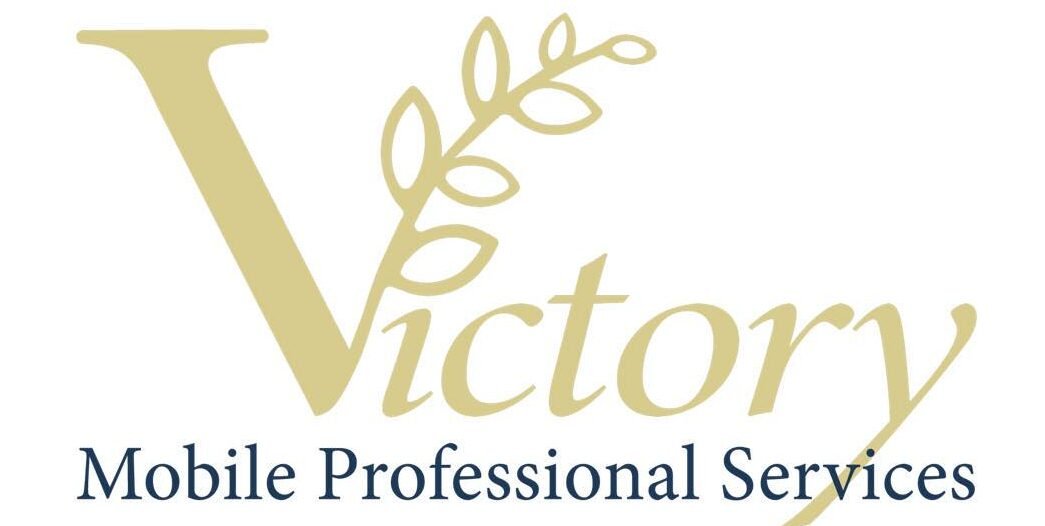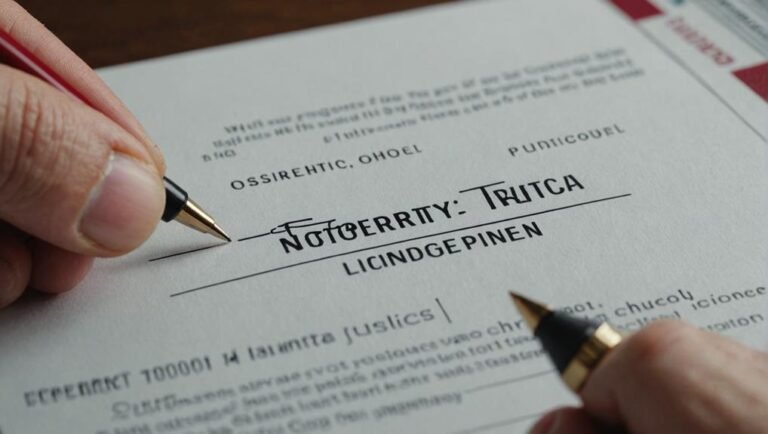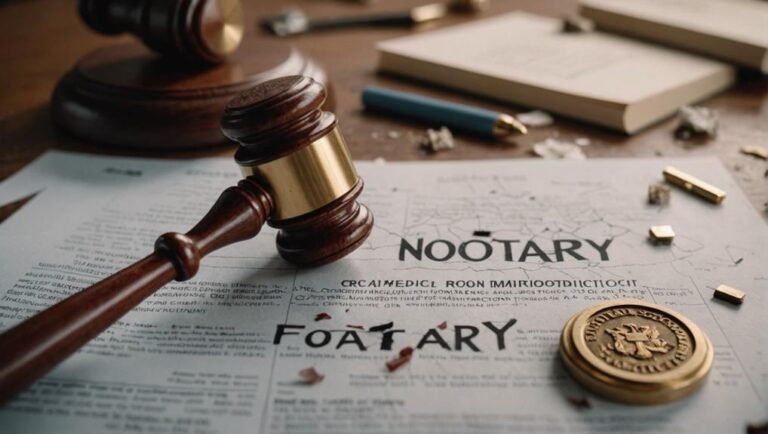To have documents notarized in Florida, you must present specific forms of ID, like a Florida driver's license or ID card, a passport issued by the Department of State, or an out-of-state driver's license/ID. Other acceptable forms include Canadian or Mexican driver's license/ID and a Veteran health ID card from the US Department of Veterans Affairs. These IDs help verify your identity for notarization purposes. Remember, adhering to Florida's ID regulations is essential for ensuring the integrity of notarial acts.
Key Takeaways
- Florida driver's license, passport, out-of-state driver's license, Canadian/Mexican driver's license, and veteran health ID are acceptable for notarization in Florida.
- Personal knowledge, credible witness affidavits, and documenting ID on certificates are verification options for notaries in Florida.
- Not accepted IDs include birth certificates, social security cards, credit cards, school IDs, and library cards.
- Strict adherence to ID verification guidelines is crucial for notaries in Florida to uphold security and legality.
- Remote online notarization in Florida accepts government-issued IDs, sworn statements, and inmate IDs from relevant authorities.
State-Specific ID Requirements
To meet Florida's notary requirements, you must adhere to the state-specific ID regulations when verifying a signer's identity. Acceptable forms of ID for notarization in Florida include U.S. Passports, state-issued driver's licenses, and government-issued ID cards with a photo and signature.
It's essential to note that birth certificates, credit cards, and social security cards aren't considered valid forms of ID for notarization in the state of Florida. When verifying a signer's identity, notaries in Florida have the option to rely on personal knowledge, government-issued ID cards, or a credible witness affidavit as approved methods.
Ensuring compliance with state regulations is vital, and Florida emphasizes the importance of following the specific ID requirements set forth for notaries. By utilizing the prescribed forms of identification and adhering to the state's guidelines, notaries can confidently verify a signer's identity in accordance with Florida's regulations.
Notary Guidelines for ID Verification
Properly verifying the identity of signers is a vital aspect of the notary guidelines in Florida. Notaries must adhere to strict ID verification guidelines to guarantee compliance and protect the integrity of notarial acts. Various identification methods are acceptable, including government-issued IDs, personal knowledge, and credible witness affidavits. Here is a breakdown of some key aspects of notary guidelines for ID verification in Florida:
| Acceptable Forms of ID | Notary Guidelines |
|---|---|
| Florida ID card or Driver License | Record form of ID used |
| Passport from Department of State | Follow state guidelines |
| Driver License/ID from another US state, Canada, or Mexico | Verify signer identity thoroughly |
| Veteran Health ID card by US Department of Veterans Affairs | Use credible witness if needed |
| Sworn statement from law enforcement officer | Ensure proper documentation |
Notaries play an essential role in upholding the security and legality of transactions by diligently verifying signer identities according to Florida's notary guidelines.
Acceptable Forms of ID for RON
Acceptable forms of ID for remote online notarization (RON) in Florida encompass a range of government-issued identification documents and sworn statements.
In Florida, acceptable forms of ID for RON include a Florida driver license or ID card, a passport issued by the Department of State, and a passport stamped by the US Immigration and Naturalization Service. Additionally, a driver license/ID from another US state, Canada, or Mexico, an ID card from any US armed forces branch, and a veteran health ID card by the US Department of Veterans Affairs are also considered valid forms of identification for RON purposes in Florida.
Notaries providing RON services in Florida may also accept an inmate ID from the Florida Department of Corrections, an inmate ID from the US Department of Justice, Bureau of Prisons, and a sworn statement from a law enforcement officer as valid forms of identification.
It's crucial to adhere to these guidelines when conducting remote online notarizations in Florida to guarantee compliance with state regulations.
Handling Expired or Suspicious IDs
When presented with expired or suspicious IDs during notarization in Florida, thorough examination is vital to confirm compliance with identification verification standards. Florida notaries can accept expired IDs issued within the past five years if they were valid at the time of issuance.
In the case of expired IDs, it's important to verify the physical description of the signer to confirm they match. Suspicious IDs should be scrutinized for any signs of tampering, inconsistencies, or counterfeit features. Notaries must be vigilant in spotting a fake by checking for alterations, discrepancies, or mismatched information on the ID.
If an ID appears questionable, it's crucial to determine how much of the ID's information is accurate and authentic. Additionally, if needed, credible witnesses or supplementary forms of identification can be utilized, following state laws and guidelines to maintain the integrity of the notarization process.
Additional Resources for Notaries
Explore the different avenues available for accessing additional resources as a Notary in Florida.
Notaries in Florida have access to a variety of resources to enhance their ID verification practices and ensure compliance with specific requirements. The NNA Hotline serves as a valuable source of assistance for Florida Notaries facing ID-related queries, providing prompt and reliable guidance.
Best Practices sections tailored for Florida Notaries offer essential tips and recommendations for effective ID verification processes. Additionally, Florida Notaries can tap into a wealth of information and resources dedicated to ID verification to stay updated on the latest developments and practices in the field.
Sharing experiences with fellow Notaries in Florida through various platforms can also provide valuable insights and foster a sense of community among professionals. By utilizing these additional resources, Florida Notaries can enhance their skills, stay compliant with regulations, and implement best practices in their notarial duties.
ID Types and Requirements by State
To confirm the identity of signers in Florida, Notaries must adhere to specific types of ID and requirements set by the state.
Florida ID requirements include:
- Acceptable Forms of ID: Notaries can confirm signer identity using U.S. Passports, driver's licenses, and government-issued ID cards with a photo and signature.
- Alternative Verification Methods: In addition to traditional forms of ID, notaries in Florida can utilize personal knowledge of the signer, government-issued ID cards, or a credible witness affidavit to validate identity.
- Non-Acceptable IDs: Birth certificates, credit cards, and social security cards aren't considered valid forms of identification for notarization in Florida.
It's crucial for notaries to comply with Florida's specific ID requirements to guarantee the accurate verification of signer identity.
Challenges in ID Verification
Facing a multitude of acceptable forms and methods, notaries in Florida encounter significant challenges in verifying IDs. The state sets specific ID requirements to uphold the credibility of individuals seeking notarization services.
Notaries must be vigilant when handling identification documents to distinguish acceptable IDs from unreliable or suspicious ones. In cases where discrepancies arise or IDs seem questionable, it's essential for Florida notaries to adhere to the state's ID verification rules meticulously.
Proper training and a deep understanding of these regulations are crucial for notaries to navigate the complexities of ID verification successfully. Additionally, Florida notaries may need to rely on alternative methods such as credible witnesses to verify IDs when presented with unique circumstances.
Acceptable Forms of ID for Notarization
Notaries in Florida encounter various acceptable forms of identification for notarization, ensuring compliance with the state's stringent ID requirements. To proceed with notarization smoothly, you must be aware of the following:
- Florida ID card or Driver License: A valid Florida ID card or driver license is widely accepted for notarization purposes in Florida, meeting the state's identification standards.
- Passport Issued by Department of State: A passport issued by the Department of State is another recognized form of identification that can be used for notarization in Florida.
- Passport Stamped by US Immigration and Naturalization Service: A passport stamped by the US Immigration and Naturalization Service is also considered an acceptable form of ID for notarization in the state of Florida.
Notary ID Guidelines in Florida
Within Florida, following the prescribed notary ID guidelines is essential for verifying signers' identities during the notarization process. Acceptable forms of ID for notarization in Florida include a Florida driver's license or ID card, a passport issued by the Department of State, or an out-of-state driver's license/ID, Canadian, or Mexican driver's license/ID.
Additionally, a veteran health ID card from the US Department of Veterans Affairs or an ID card from any US armed forces branch are also considered acceptable for identification purposes in Florida. Notaries in Florida have the option to verify identity through personal knowledge or utilize a credible witness affidavit for both known and unknown signers.
It's important for Florida notaries to carefully document the form of identification used on the notarial certificate and follow all stipulated procedures to guarantee the authenticity and legality of the notarization process. Following these guidelines is vital to uphold the integrity of notarial acts in Florida.
Unacceptable Forms of ID
Certain forms of identification are considered essential for notarization in Florida, including birth certificates, social security cards, and credit cards.
To guarantee the authenticity of the identity presented, Florida law prohibits the use of school IDs, library cards, and temporary driver's licenses for notary services.
For a document to be notarized in Florida, only specific forms of government-issued ID such as U.S. Passports, driver's licenses, or state-issued cards with a photo and signature are accepted.
It's important to adhere to these guidelines as notaries in Florida must strictly follow the state regulations surrounding acceptable forms of identification for verifying the signer's identity.
Frequently Asked Questions
What Identification Is Acceptable for a Notary in Florida?
To be a notary in Florida, you need to know the acceptable identification, guidelines, and verification process. Options include various valid forms like a Florida ID or passport. Remember, follow procedures and document everything.
Can a Notary Accept an Expired ID in Florida?
You cannot accept an expired ID as a Florida Notary. The law mandates current identification for notarization. Acceptable forms include a Florida ID card, driver's license, or passport. Adhere to Florida's strict guidelines.
What Are the Requirements to Notarize a Document in Florida?
To notarize a document in Florida, you must follow strict ID verification, identification rules, and signature authentication. Adhering to notary guidelines and responsibilities is essential, ensuring proper identification verification and document authentication. Make sure you undergo proper notary training and certification.
What Are Valid Forms of ID Florida?
To notarize in Florida, show acceptable documents for ID. These include photo ID like FL DL, passports, out-of-state DLs, US military IDs, or VA cards. Notary rules allow various proofs for verification.
Conclusion
To sum up, when notarizing documents in Florida, it's crucial to confirm the identity of the person presenting the ID. Approved forms of ID comprise driver's licenses, state ID cards, passports, and military IDs.
In a recent case study, a notary came across an outdated passport but managed to confirm the person's identity through supplementary documentation.
Always adhere to state-specific protocols and never acknowledge dubious or expired forms of ID to maintain the integrity of the notarization process.






